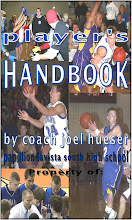Below is an excerpt from Coach Terry Pettit's new book, "Talent and the Secret Life of Teams". I think it is very good and has many valid arguments. Enjoy:I have a friend who tells me that in 1953 he could fix about anything on a Chevy with a combination wrench. Those days are gone.
So are the days when organized sport meant the kids in the neighborhood gathering at the end of the block, without their parents or other adults, to negotiate who would play on which team, who would be chosen last, and who would play right field.
Some people argue that in moving to a culture of spontaneous play to a culture of organized sport, we have improved the technical skills of our kids, while stunting the growth of other skills, such as negotiation, initiative, communication, and the ability to solve problems without adult intervention.
To put it bluntly, we are over-organizing our kids' play and in doing so delaying their ability to develop the skills that will help them the most as adults.
The more our culture relies on organized sport to teach our children how to play and compete, the more expectations parents have for the coaches who work with our kids.
We want the coach to teach our kid how to play.
We want our kid to play shortstop when she's not pitching.
If our kid gets really good, we want her to be on an elite team where she can travel to other places and develop at a faster pace.
And, most importantly, we want the coach to make the experience painless. We do not want our children to suffer the indignity of being a substitute, a role player, or approach any scenario that might be interpreted as failure.
We want all this for our children despite the fact that success in our adult lives is mostly about developing the skills to deal with bad hops, missed promotions, delayed gratification, and the occasional bounce of good luck.
This is a lot to ask of someone who has been trained as a history teacher, pipe fitter, surgeon or someone who is volunteering to coach because nobody else would. It would be a lot to ask of a professional coach with a master's degree in sports psychology.
Given the fact that most of the people who coach our kids are not trained in coaching, it might be helpful to identify some characteristics of great coaching that are available to everyone regardless of experience.
Here are some behaviors you might bring forth if you are asked to coach a team, and you might look for these same qualities in evaluating someone as a potential coach for your son or daughter. These characteristics are just as important if you're coaching the Little Bears as they are if you're coaching the Huskers.
• All great coaching begins with hope. Great coaching is communicating through posture, language, chalk talks, and intimate conversations the ultimate belief that good things are going to happen.
• Great coaching is being able to communicate to an athlete that she already has the "right stuff" to get the job done. We may need to improve her fundamentals. We may need to work harder. We may need to make some adjustments, but we don't need a heart transplant. We already have DNA that, combined with hard work, will allow us to be great.
• Great coaching is more concerned with the process and less concerned with the outcome (parents take note). Are we committed to behaviors that will lay the foundation for success? Are we on time? Do we look each other in the eye when we speak? Do we give great effort? Do we maintain the sacredness of the group by not voicing our frustrations outside the team? Do we encourage our teammates even when we are on the sidelines? Are we passionate about our commitment?
Committing to new behaviors is as important to a team's success as a solid foundation is to a new house. It's quiet and it doesn't get much press, but nothing else can move forward without it.
• Great coaching understands the necessity for risk and the value of failure. There is no growth without pain. The surest way to not win a championship is to try to protect your success. If you are in the presence of great coaching, the coach is going to ask you to become a little bit more uncomfortable than you want to be as you risk new roles, new techniques and new expectations.
• All performance, whether individual or team, is based on trust. Athletes have the best chance for performing well when they trust themselves. Teams have the best chance for success when coaches and parents create a climate where athletes feel the adult's care for them is not based upon performance. The support is unconditional. Athletes have the best chance to learn what trust is all about if they see it modeled by their parents and coaches.
The days of '53 Chevys and pickup games are gone and they are not likely to return unless our culture begins to place more value on neighborhood play and less dependence on mini-vans and organized sport.
In the meantime, my wish would be that everyone's son or daughter has the opportunity to play for a coach who is hopeful about the team's future, who believes your kid has the right stuff to get the job done, who encourages your son or daughter to commit to behaviors that will give her the best chance for success, and who creates an environment where kids have the opportunity to risk, rise, fall, and risk again. Then again, these characteristics would make for great parenting as well.
To purchase a copy of "Talent and the Secret Life of Teams" go to
www.terrypettit.com
